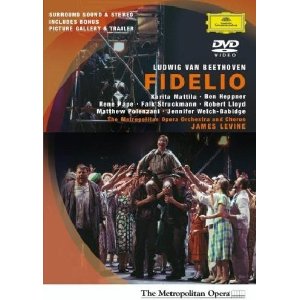Beethoven (2)
1. Fidelio 2002 (Flv)
500 MB

Karita Mattila (Leonore), Ben Heppner (Florestan), René Pape (Rocco), Falk Struckmann (Pizarro), Matthew Polenzani (Jaquino), Jennifer Welch-Babidge (Marzelline) The Metropolitan Opera Orchestra and Chorus James Levine – conductor
Finnish soprano Karita Mattila virtually shines as Leonore in a part that seems written for her and furthermore this production brings out all her strengths as a performer. Vocally, the part lies perfect for her voice, much of it in the middle register, where she has the necessary weight and her high Bs are rock solid. Her slightly awkward/shy air on stage furthermore is to her advantage in this trouser role, which she manages to pull off vocally while at the same time remaining believable on stage. Furthermore she remains true to Beethoven´s phrasings and the classical style (as opposed to the Wagnerian floating style applied by others in this part). I cannot imagine a better casting of this role.
German bass René Pape is vocally perfect as a curiously disorientated and disheveled Rocco, with a completely different air about him on stage than usual, as well as applying an edginess rarly seen in the part. Falk Struckmann´s voice basically gives the impression of a character-baritone, but as Pizarro, he is effective. Ben Heppner delivers his one aria in this one-aria role satisfying from a vocal point of view, but a romantic hero he will never be, even less a convincing actor.
Fine performance from James Levine and the orchestra, with considerably more density and edge than he applies to Wagner, though the tempi tended to be on the fast side (for him). --- mostlyopera.blogspot.com
download: yandex 4shared gett mega mixturecloud
2. Piano Concerto No. 3 in C Minor 2007 (MP4)

I. Allegro con brio II. Largo III. Rondeau. Allegro Piano: Krystian Zimerman Leonard Bernstein Wiener Philharmoniker
Krystian Zimerman is my absolute No. 1 among the pianists of our time, not because he's Polish of course, but because he is a true magician. He is often accused, though, that his recordings lack passion, some kind of spontaneity etc. Indeed, it is a fact that Zimerman prepares each of them very carefully and releases them rarely. It is a fact that he studies the notes very long and corrects almost every phrase played before, in order to find even better way of interpretation. But I ask: what's the matter? Do this spontaineity really is necessary while buing a recording, especially a set of recordings? Or maybe one rather seeks his/her ideal, perfect in technique and deep in interpretation, and every "scratch" on these technique and interpretation makes him disappointed? Well, I know that I am such a person; when I buy a recording, I want it to be ideal. Absolute ideal. Whereas for Beethoven's e.g. Violin Concerto or Fidelio I haven't managed to find my ideal - I actually have for Missa Solemnis (Gardiner!), String Quartets (Alexander)... and for the magnificent Piano Concertos.
This set doesn't give me much place to write about, because, as I've just said, there is not even a scratch on this precious gem. Zimerman plays so wonderfully, that when I got the set and listened to all the pieces - I knew I'd immediately forget about my all 3 previous sets of the Concertos. And this happened. Now I listen to it no matter which movement of which concerto I want to hear, because here it is played far better than anywhere else. Do you imagine every note, every second played perfectly? I bet that in all recordings you have there are some moments you'd want to correct, play better. Not here. The cadenzas, brilliant. Parts in the foreground, as well as in the background, behind the orchestra, brilliant.
As for the orchestra, I can say with pleasure, that Bernstein is surely in his best form here. He doesn't conduct too slow, as he often does; he is the master of the orchestra, he controls them totally.
I should shut up, because it's getting too long, but one small thing: just listen to the samples. The comparison of small details in different recordings is great fun. I don't know whether it is in the sample, but try to compare e.g. the sound of the orchestra in the main theme of the Emperor Concerto's 1st movement in few recordings. Only here it is such a magnificent, sharp, clear melody. Or the beginning of Rondos in the 1st and 3rd. Or... OK, finished. This is the recording of your dreams. Believe me. –-Gustaw Jokiel
download: uploaded filecloudio anonfiles yandex 4shared solidfiles mediafire mega nornar
Zmieniony (Niedziela, 26 Styczeń 2014 16:30)








